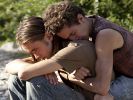Eye For Film >> Movies >> Wild Life (2014) Film Review
Wild Life
Reviewed by: Anne-Katrin Titze

Cédric Kahn's disquieting Wild Life (Vie sauvage) makes us feel the cold and the tension and the power of an idea within the first minute of its relentless, precise, nonjudgmental gaze on a torn apart family.
Co-produced by Two Days, One Night directors Jean-Pierre and Luc Dardenne, the film is based on a true story, the Xavier Fortin case, that Kahn choreographs into part tug-of-war, part pirouette with the land. A lot of running away before the molecules, at least externally, somewhat settle, commands our attention.

Paco (Mathieu Kassovitz) and Nora (Céline Sallette) left society behind and chose the "wild life" with their three sons, living in a caravan in the countryside with animals, and no electricity or running water. Nora smokes nervously, a golden leaf dangling from her ear, you can almost smell the nicotine settling on the milky glass windows of the camper. Her long blonde dreadlocks will soon be a sign of the past, because she has had enough and wants to take her sons back to civilisation. Hair is important and the cutting of it is proof of betrayal for Paco, who takes his role as father very seriously.
His two biological sons, Tsali and Okyesa will grow up with their father, hidden from the police and their mother who has custody, as well as their older half-brother Thomas (Tara-Jay Bangalter). Under false names in various rural locations and commune constellations they are home schooled with the home part more in question than that of education. The boys' faces tell us everything we need to know. David Gastou as 9 year-old Tsali and Sofiane Neveu as 8 year-old Okyesa can look filthy and hateful, beautiful and strong, desperate and defiant as they reflect back to us their father's dream.
It is as important what Kahn decides to show, as what he omits. We see Paco pierce his sons' ears himself (the earrings come in handy for us to identify them when they are played as teenagers by different actors, Romain Depret and Jules Ritmanic) and instruct one of them to follow a lady with a suitcase at a train station to distract authorities. In a particularly strong sequence, he teaches them about the forest. They greet a little finch, let a scorpion crawl all over them, identify a grass snake and catch a fish for dinner with their bare hands. The harmony with nature is fleeting and comes at a price. Okyesa dreams about his mother and Kahn gives us the dream with the little boy dressed in imagined Breton stripes (the costume designer is Nathalie Raoul), a sartorial reminiscence of early happy childhood days in Normandy.
This kind of care with detail gives Wild Life a substance many films lack while depicting semi-nomad existence and its perils. I believe the cheese-making and the jealousies because they are never just ornament or argument. Paco, who packed up his horse and capuchin monkey, suggestive of Pippi Longstocking's friends, is determined to save his family from a capitalist society he abhors. Kassovitz fills the unflagging father with so much wild conviction that we can almost forgive the torture he inflicts. His spectacular performance triggers all kinds of feelings towards Paco and allows the audience to change their minds a few times in the process. How many shades of anger are there?
Céline Sallette's open face grounds the film, although the desperate mother is absent during a long stretch of the boys' childhood. Nora, whose name in itself is an ironic wink at Ibsen, doesn't need many words - the filth and mud stuck to her hungry children's bodies were too much for her to justify the lifestyle. Most spectators who go to the cinema won't have a hard time relating to her and that is precisely why we are thrown into the wilderness with the "lost boys."
If you think you can come to an easy judgement, the film seems to say, think again. "What could we choose when we were seven or eight years old?" one brother asks the other. How many lives in what we call civilisation are already decided at that age? The physical and emotional endurance it takes is never romanticised as we are challenged to identify with their battles.
Wild Life (Vie Sauvage) will be screening at the 20th Anniversary of Rendez-Vous with French Cinema in New York with Cédric Kahn and Céline Sallette scheduled to participate in Q&As.
Reviewed on: 24 Feb 2015















